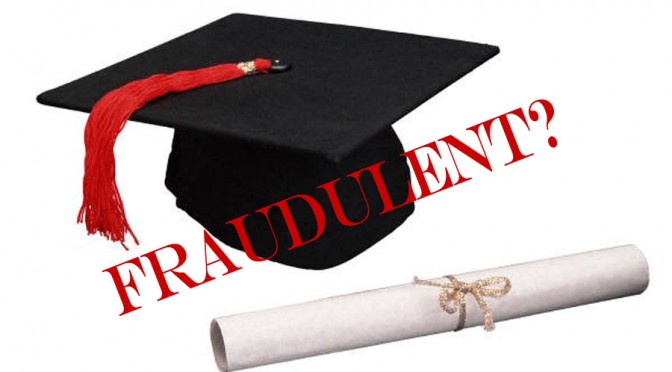Or just another case of grade inflation?
Bad news from the National Assessment of Educational Progress: as of 2009, a majority of high school students scored “basic” or “below basic” in reading and math skills.*
(*Kudos to the Wall Street Journal for not using “progress report” in its article or headline; here for the rest who fell into that trap.)
Hmmm: in the early Nineties, 74% of high school students graduated. These days, it’s 81%. Clearly, the additional 7% of graduates aren’t driving those proficiency scores higher.
The report also informs us that based on SAT scores, only 43% of high school students are prepared for college. Whether or not that number has been extrapolated to the entire graduating population is unclear. If not, the prepared-for-college students represent 43% of the only some 45% who take the SAT (as of 2007).
All of this means…
Well, let’s let the Director of the National Assessment Governing Board explain it:
“Students get a mixed message — students have a low bar to graduate from high school but its’ not a high enough bar to really pursue a career actively when they leave.”
Hello reality
I shall avoid vulgarities and statements of stinky things obvious to Mr. Holmes, but, yeah, we’ve increased graduation rates by dumping standards, and the kids know it.
I’m sure that more than a few administrative careers have been advanced based on those higher graduation rates. I am also very sure that more than a few teachers are ready to throw in the towel at the end of every year, frustrated that their attempts to uphold standards were destroyed in exchange for those higher graduation rates.
Now that it’s graduation season, those teachers are toying with their grade books to see who they’re going to pass and how. And administrators are busy counting heads and printing commencement programs for the Class of 2014.
Is our glass one-third empty, or one-third full?
More graduates is admirable, but it didn’t happen with more learning. There is no global solution here. By retaining more kids through high school we are adding to opportunity, which is a core social goal and commendable at that.
BUT… in the race to accommodate, we’re losing potential. Kids who could — and should — be doing better, are getting sucked into the equity hole and passed along to college, prepared or not.
Not all of them are unprepared, especially in the underperforming category, which high schools create when they jam smart kids into irrelevant and unnecessary processes that make up much of what we call high school.
Two examples
One of our current students in the A+ Club is talented, super smart, and faces tremendous difficulties focusing on independent work. He’s in the 45% prepared for college based on SAT scores. And he is at risk of failure Senior year spring, because he’s not graded on learning in high school, he’s graded on workflow.
So what’s a teacher to do? He can ace the exam but that homework column is one-third full, shall we say. One of his teachers is now figuring out how to pass him. In what is truly a struggle of conscience, he’s trying to weigh the value of content learning over workflow.
Will that child’s diploma mean less if he’s passed along over the sums of the grade book? Or will he really benefit from a summer school credit to push up the technicals? We all know the answer to that, already, even as his teacher struggles with the dilemma.
Another example:
I just received an inspiring, wonderful note from a former student who is now heading into his Senior year in college. I don’t know his SAT scores, but I do know that if high they represented him well, and if low they defined him wrong.
In my 9th grade classroom more than a few years ago he was eager to learn, creative — and slow on his homework. He didn’t need to do his homework to learn. I knew that. But I also had to have something to grade him on. So we worked it out. In one of my 12th grade courses, he was still more interested in ideas than deadlines — and it didn’t matter. With or without late work, he was my most thoughtful student in that class, and I gave him a Department award for it.
Learning can and ought to happen always and at any given time, and grades may or may not reflect it. This young man learned how to learn, and despite not the best high school grades, he’s now headed skyward. He has created for himself a true college experience, full of learning and intellectual exploration, and he is making plans for graduate school.
Yes, the glass is one-third full.
High school isn’t for everyone, and what it defines via GPAs, SATs, and test scores doesn’t necessarily measure academic worth or a child’s future. The standards, though. must exist.
My suggestion is that we adopt far higher standards and at the same time embrace failure– and support it through to learning and achievement meaningfully.
And summer school is not meaningful.
Meaningful is the book project another teacher gave our talented, executive function-challenged student in order to pass him on the class: “Show me you read it and how it informs your own intellectual and artistic development.” What a great assignment!
I see no compromise there. It’s the 7th grade teacher who gave my checked-out son “Moby Dick” to read instead of a few selected chapters “Of Mice and Men,” which he had already read entirely two years before and was bored silly over in a class of students with higher grades and far less learning than he.
It’s the one true teacher in my life, dear Professor Wright at Hamilton College who told me, “Bromley, I’d fail you except that I don’t want to see you here again next year.” Instead, he gave me a challenging and meaningful independent project on which I worked so hard — unlike what I had done in his regular class, even though I aced all the tests — and earned a true B+.
For my two former students, for my son, and for me back in the day, learning and grades are unrelated events. Maybe our problem isn’t so much the learning as the grades, and maybe we could better align grades with learning.
Otherwise, as the Director of the National Assessment Governing Board knows, as teachers know, and students know: a high school diploma is as often a measure of sitting through four years of classes as it is of learning and life preparation. Whatever it is, we’re not grading learning any more accurately as our graduation rates go up. Which adds up to a clear case of grade inflation.
Nevertheless,
Congratulations, Seniors!
 Thankfully, however, it’s more often accomplishment than not, even for those who didn’t cut it on their SATs or GPA.
Thankfully, however, it’s more often accomplishment than not, even for those who didn’t cut it on their SATs or GPA.
For all the teachers trying to figure out grades, to all the parents panicked and afraid, and to all the students who could have done better over the school year but are going to move on now, I say congratulations for keeping that glass at least one-third full.
– Michael

It really depends on a school if they will implement something that would make those students to be affected on this kind of matter. It might be a good thing for them or it will just make them to take school for granted.